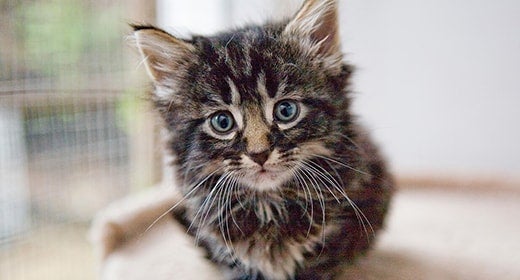

So you have a new kitten — congratulations! You’re about to embark on a pet ownership journey that could span several decades. But if you’ve never owned a cat or kitten before, you may have questions about how to keep your kitten healthy and thriving. Use our guide to get started, and welcome to pet parenthood.
When you choose a veterinarian, you’re choosing a partner in your kitten’s health care. Scheduled vaccinations and yearly examinations mean that you’ll see your veterinarian on a regular basis, so choose wisely. When researching veterinary clinics for your cat, make sure to do the following:
Owners should have their cats spayed or neutered unless they plan to show or breed them. Veterinarians advise spaying or neutering by at least 6 months of age. Consider the following:
Each year, millions of cats are euthanized because the new cat population far exceeds the number of homes that can be found for them. Here’s why you should consider spaying or neutering your kitten:
While we hope your kitten experiences few, if any, health issues over the course of her life, it’s smart to familiarize yourself with common cat ailments. Use our guide to some of the most common medical issues that can affect kitten health. The more you know, the better you’ll be able to notice when your kitten isn’t feeling well.
Most common in warm spring and summer months, these pinhead-size insects can be active all year long. Fleas can jump onto your cat, lay their eggs, breed, and spread to your furniture and to you, looking for blood. In addition to causing discomfort and scratching in many cats, fleas can transmit parasitic or infectious diseases, including tapeworms. A severe flea infestation may, in turn, cause anemia (low red blood cell count) and/or allergic dermatitis, a skin allergy characterized by itching and irritation. Though some cats become irritable and scratch, others have no visible signs of discomfort.
Luckily, flea prevention treatments are numerous and easy to give:
Hairballs are tube-shaped, brown masses of hair fibers. When cats clean themselves, they swallow fur. Because hair isn’t digestible, it either passes through and ends up in the litter box or it is vomited.
Cats that pass hairballs more than once a week or that pass foul-smelling hairballs may have a serious underlying health problem. See your veterinarian if your cat experiences frequent hairballs.
Here’s how to help prevent hairballs in your kitten or cat:
Feline lower urinary tract disease is a potentially fatal, painful inflammation of the lower urinary tract that can be caused by viruses, bacteria, diet, decreased water consumption or urine retention.
Symptoms include blood in the urine, difficult and frequent urination (often in small quantities), inappropriate urination, lack of energy and loss of appetite.
You can help your cat maintain proper urinary acidity and magnesium levels through a properly balanced diet that helps promote urinary tract health.


Cats don’t lack personality; that’s for sure. They can be shy, outgoing, snuggly, independent, energetic, relaxed and everything in between. Yet some breeds tend to exhibit certain traits more strongly than others. Here are our picks for what we’re calling the Cat Personality Awards.
This larger cat has a big heart to match. They’re often very social and happy to chat with you, whether they’re curled up on your lap or following you around the house. They make excellent family pets because more family members means more people to snuggle and play with.
Also outgoing: Ragdoll, Siamese, Burmese
Gentle and calm, this soft and silky-furred feline is friendly without being demanding. Ragdolls are usually totally cool sharing a house with other pets and kids. They don’t stress much about routine changes or even being carried around. Their motto? It’s all good.
Other cool kitties: Scottish fold, Birman, British shorthair
Making up around 90% of cats in the U.S., with more than 80 colors and patterns, domestic shorthairs are a melting pot of different breeds. They were originally working cats used to hunt mice and other critters on farms. They still love to stalk, hunt and pounce on toys and play games with their owners — so expect to spend lots of energetic playtime together.
Also ready to play: Siamese, Maine coon, Manx
This popular breed has been around humans since the 1600s, but is satisfied doing its own thing. Gentle, docile and quiet, Persian cats don’t insist on a lot of attention. They’re just as content sitting on your lap or observing what’s going on by themselves from a sunny perch across the room. They can be discerning in who they give their affection to, but you’ll be on their good side once you earn their trust.
Also fine on their own: Russian blue, American shorthair, Norwegian Forest cat
The idea of training a cat may seem hilarious, but the curiosity and intelligence of Abyssinians make them highly trainable. Some can even be taught tricks or to walk on a leash and harness. Training and playing games are perfect ways to direct their affectionate energy.
Also eager to learn: Bengal, Siamese, American shorthair
Owning this affectionate, hairless breed means you can spend more time cuddling and less time lint-rolling your clothes. They do require regular baths, but that just means more time to hang out together.
Other neat freaks: Siamese, Russian blue
Thinking of getting your first kitty? It’s hard to pick just one breed, so we’ve got three:
Remember, most cats — especially those found in shelters — are a mix of breeds, which just means they often combine the best of all cat personality traits! Whatever personality you’re looking for in a cat, you’ll know it when you find your fuzzy soulmate.